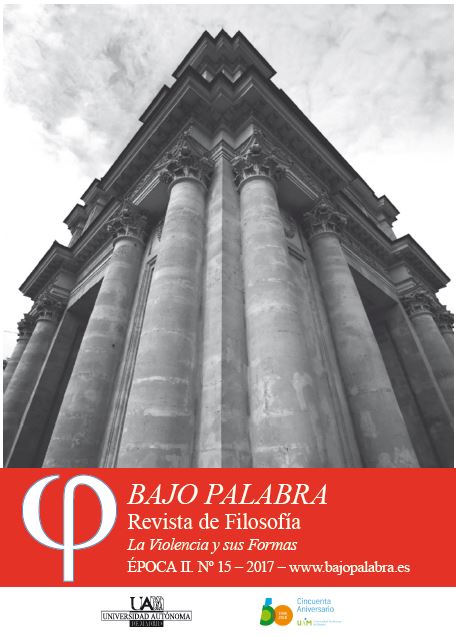Keywords:
Anarchism, State, Violence, Authority, LawCopyright (c) 2017 Elina Ibarra

This work is licensed under a Creative Commons Attribution 4.0 International License.
Abstract
Violence is a problem in relation to the acquisition and management of power, keeps a very close relationship has a long tradition in political theory. Among the many postures that have addressed this problem, we can circumscribe around the question: What lies the relationship between the Force and the law? Question that has been played by the concepts of "legal community" and "Band of Thieves". Also, in this question and its crystallization, the relationship that both the State and Anarchism keep violence is found. Now, do the following route, without excluding other possible: the first analysis on this problem have a clear and strong start in Ancient Greece with Plato, continues in the Roman Empire with Agustin, it reformulates in Modernity Machiavelli, Hobbes and Rousseau, in the nineteenth century is taken up by Anarchism Tucker, and early twentieth century, Barrett, to finally get to this day, with Hans Kelsen, Pure Theory of law. All these theories highlight the questionable distinction between the State, in its legal system and a gang, as both associations are based on the use of violence for the establishment of their power, except, subtle differences. In relation to violence, State and Anarchism, have a radical difference to the state, is not only a constituent element, that is, essential, such that it can be defined as the organization that has the exclusive and legitimate use of violence but it has to resort to it as a means of maintaining their authority; however, in most cases, where Anarchism has resorted to violence, this has been used, not to consolidate power, but to fight and essentially dissolve that source of authority, not to "take the power".
Downloads
References
Agustín (1979) La ciudad de dios, Editorial Porrúa, México
Arendt, Hannah (1999) Orígenes del totalitarismo, Taurus, España
Barret, Rafael (1954) Obras Completas, Editorial Americalee, Buenos Aires
Bayer, Osvaldo (2009) Rebeldía y esperanza, Editorial Página 12, Buenos Aires
Bobbio, Norberto (1992) Thomas Hobbes, FCE, México (1991) De Hobbes a Gramsci, Debate, Madrid
Bobbio, Norberto y Bovero, Michelangelo (1986) Sociedad y Estado en la filosofía política
Corral, Francisco (1994) El pensamiento de Rafael Barret, Editorial Siglo XXI, Madrid DelRenacimiento a la Ilustración I, Enciclopedia iberoamericana de
D´Auria, Aníbal (2012) Teoría y Crítica del Estado, Eudeba, Buenos Aires
Fernández Santillán, José (1996) Hobbes y Rousseau, FCE, México Filosofía VI, Trotta, Madrid, 1994
Galimidi, J. L. (2004) Leviatán Conquistador, HommoSapiens, Argentina
Hobbes, Thomas (1992) Leviatán, Fondo de Cultura Económica, Buenos Aires
Maquiavelo, Nicolás (1992) El príncipe, Editorial Alianza, Buenos Aires
Platón (1980) República Eudeba, Buenos Aires
Rodríguez Feo, Joaquín (1999) “Hobbes”, en Victoria Camps compiladora, Historia de la ética moderna, FCE, México
Rousseau, J. J. (2001) Discurso sobre el origen de la desigualdad entre los hombres (2001) Discurso sobre las ciencias y las artes, El Ateneo, España (2001) El contrato social, El Ateneo, España
Sheldon S. Wolin (1974) Política y perspectiva, Amorrortu, Buenos Aires
Strauss, Leo (2012) “Nicolás Maquiavelo”, en Historia de la filosofía política, Leo Strauss y Joseph Cropsey (Compiladores) ) FCE, México
Tucker, Benjamin (1973) “La relación entre el Estado y el Individuo”, en El liberalismo de avanzada, Editorial Proyección, Buenos Aires
Viñas, David (2009) Anarquistas en América Latina, Editorial Paradiso, Buenos Aires Volumen 2, Crítica, Barcelona
